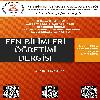Nilay KEFELİ, Gülhan ATAGÜN, Nur KOBAL BEKAR, Reyhan KARAYEL, Demet ÇELİK ERTEKİN, Şenay MURAT DOĞRU, Pınar GÜNER
“Z Kuşağı Tarımla Buluşuyor 3” Doğa Eğitimi Projesinin Değerlendirilmesi
Bu çalışmada, 2000’li yıllarda doğan ve “Z Kuşağı” olarak adlandırılan çocukların tarımı hem eğlenerek hem de uygulamalar gerçekleştirerek öğrenmelerini sağlamak amacıyla “Z Kuşağı Tarımla Buluşuyor 3” adlı doğa eğitimi proje uygulaması gerçekleştirilmiştir. Çalışma, tek grup ön test-sontest deneysel desen olarak tasarlanmıştır. Bu kapsamda Samsun ilinde Karadeniz Tarımsal Araştırma Enstitüsünde gerçekleştirilen ve TÜBİTAK tarafından desteklenen doğa eğitimi ve bilim okulu projesine katılan Samsun Aile ve Sosyal Politikalar İl Müdürlüğü Çocuk Evleri Koordinasyon Merkezi bünyesinde 5. sınıfı bitirmiş toplam 20 öğrenci bu araştırmanın çalışma grubunu oluşturmaktadır. Doğa eğitimi projesini değerlendirmek amacıyla öğrencilere; kelime ilişkilendirme testi, açık uçlu soru formu ve yarı-yapılandırılmış mülakatlar öntest ve sontest olarak uygulanırken, proje görüş formu ise proje sonrası sontest olarak uygulanmıştır. Çalışma sonucunda öğrenciler; tarım ve tarımsal uygulamalara yönelik yeni bilgiler edindiklerini ve bilinçlendiklerini, proje uygulamaları sırasında eğlenerek öğrendiklerini belirtmişlerdir. Bu nedenle, benzer doğa eğitimi proje uygulamalarının sayısı artırılırsa, öğrencilerin tarımsal uygulamaları inceleyebilmeleri ve öğrenebilmeleri sağlanacaktır
Anahtar Kelimeler:
Tarım, doğa eğitimi, z kuşağı, proje
The Evaluation of “Z Generation are Meeting with Agriculture 3” Nature Education Project
This study "Z Generation are Meeting with Agriculture 3" was carried out, aimed to teach children which called “Generation Z” who were born in 2000 agriculture while practicing and also having fun. This study is designed in single group pretest-posttest experimental design. In this context, 20 students studying in the 5th grades in the Children's Houses Coordination Center of Samsun Family and Social Policies Provincial Directorate who participated in the nature education and science school project supported by TUBITAK and organized in Karadeniz Agricultural Research Institute in Samsun province constitute are the study group of this research. In order to evaluate the nature education project, word-association test, open-ended questionnaire and semi-structured interviews were used as pretest and posttest, while the project opinion form was applied as posttest. At the end of the study, the students stated that they acquired new information about agriculture and agricultural practices, and that they learned them by having fun during project. For this reason, if the number of similar nature education project applications is increased, students will be able to examine and learn agricultural practices
Keywords:
Agriculture, nature education, z generation, project,
___
- Adıgüzel, O., Batur, H. Z. & Ekşili, N. (2014). Kuşakların değişen yüzü ve Y kuşağı ile ortaya çıkan yeni çalışma tarzı: Mobil yakalılar. Süleyman Demirel Üniversitesi Sosyal Bilimler Enstitüsü Dergisi, 1(19), 165 - 182.
- Akay, C. (2013). The opinions of the secondary school students towards science concept following TÜBİTAK 4004 “learning by doing summer science school”. Mersin University Journal of the Faculty of Education, 9(2), 326 - 338.
- Altuntuğ, N. (2012). Kuşaktan kuşağa tüketim olgusu ve geleceğin tüketici profili. Organizasyon ve Yönetim Bilimleri Dergisi, 4(1), 203 - 212.
- Bahar, M., Johnstone, A.H. & Sutcliffe, R.G. (1999). Investigation of students’ cognitive structure in elementary genetics through word association tests. Journal of Biological Education, 33, 134 - 141.
- Erdoğan, M. (2011). Ekoloji temelli yaz doğa eğitimi programının ilköğretim öğrencilerinin çevreye yönelik bilgi, duyuşsal eğilimler ve sorumlu davranışlarına etkisi. Kuram ve Uygulamada Eğitim Bilimleri, 11(4), 2223 - 2237.
- Erdoğan, M. & Özsoy, A. M. (2007). Graduate students’ perspectives on the human and environment relationship. Türk Fen Eğitimi Dergisi, 4(2), 21 - 30.
- Fraenkel, J.R., Wallen, N.E. & Hyun, H.H. (2012). How to design and evaluate research in education (Eighth Edition). New York, NY: McGraw-Hill Education.
- Gülay Ogelman, H. & Durkan, N. (2014). Children meeting with the soil: Efficiency of soil education project for young children. The Journal of International Social Research, 7(31), 632 - 638.
- Gülay Ogelman, H., Önder, A., Durkan, N. & Erol, A. (2015). “Tipitop ve arkadaşları ile toprağı tanıyoruz 6” isimli toprak eğitimi projesinin etkisinin incelenmesi. International Journal of Social Sciences and Education Research, 1(2), 476 - 488.
- Karataş, A. & Aslan, G. (2012). The role of environmental education in gaining environmental awareness for elementary school students: the sample of ecology based summer camp Project. Journal of World of Turks, 4(2), 259 - 276.
- Köseoğlu, M., Özdemir, A., Baysan, S., Akar-Vural, R., İnci, E., Kiraz, D. E., Gençsoylu, İ., Boz, Ö., Hazır, C. & Ertuğrul, F. (2011). Çine arıcılık müzesinde ekoloji temelli doğa eğitimi. Anadolu Doğa Bilimleri Dergisi, 2(2), 24 - 33.
- Lakin, L. (2006). Science beyond the classroom. Journal of Biological Education, 40(2), 88 - 90.
- Marulcu, İ., Saylan, A. & Güven, E. (2014). 6. ve 7. sınıf öğrenciler için gerçekleştirilen “küçük bilginler bilim okulu”nun değerlendirilmesi. Mustafa Kemal Üniversitesi Sosyal Bilimler Enstitüsü Dergisi, 11(25), 341 - 352.
- Özdemir, P., Akfırat, N. & Adıgüzel, Ö. (2009). Bilim ve yaratıcı drama eşliğinde doğa eğitimi. Yaratıcı Drama Dergisi, 4(7), 67 - 74.
- Palmerg, I. E. & Kuru, J. (2000). Outdoor activities as a basis for environmental responsibility. Journal of Environmental Education, 31(4), 32 - 37.
- Polat, G. (2013). Determination of the cognitive structures of year secondary school students through Word association test techniques. Necatibey Faculty of Education Electronic Journal of Science and Mathematics Education, 7(1), 97 - 120.
- Taş, H. Y., Demirdöğmez, M. & Küçükoğlu, M. (2017). Geleceğimiz olan z kuşağının çalışma hayatına muhtemel etkileri. OPUS – Uluslararası Toplum Araştırmaları Dergisi, 7(13), 1031 - 1048.
- Uzun, N., Sağlam, N. & Varnacı Uzun, F. (2008). Yeşil sınıf modeline dayalı uygulamalı çevre eğitimi projesinin çevre bilinci ve kalıcılığına etkisi. Ege Eğitim Dergisi, 9(1), 59 - 74.
- Williams, S. (2010). Welcome to generation z. B&T Magazine, 60 (2731).
- Vaske, J. J. & Kobrin, K.C. (2001). Place attachment and environmentally responsible behavior. The Journal of Environmental Education, 32(4), 16 - 21.
- Yayın Aralığı: Yılda 2 Sayı
- Başlangıç: 2013
- Yayıncı: Fen Eğitimi ve Araştırmaları Derneği
